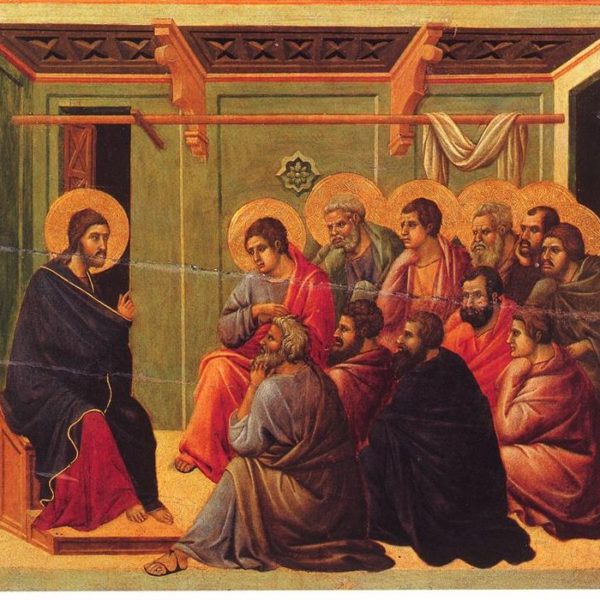
Sixth Sunday of Easter, Year C (5/26/2019)
Acts 16:9-15
Psalm 67
Revelation 21:10, 22-22:5
John 14:23-29
Click the play button to listen to this week’s sermon.
God does not give peace as the world gives it. What usually passes for peace isn’t much more than anxiety management. True peace does not remove the problems from the person, but preserves the person in the midst of the problems, plunging her into the river of the water of life, flowing from the throne of God and of the Lamb, carrying her beyond the boundaries of her anxiety into God’s brilliant future.
“Peace I leave with you; my peace I give to you. I do not give to you as the world gives.”
Who among us would not count peace among the highest values? “O venerable peace,” the ancients praised, “dispenser of all good things!”[1] But peace is an idea so grand that it’s difficult to pin down. It’s a wonderful theory, but how is peace actually accomplished in our lives? Where does it come from?
Christian Wiman gets at this question in a reflection about the scarcity of peace in so much of our daily life: [Excerpt from My Bright Abyss, pp.85-6].
The means of relief to which Wiman refers – tennis, yoga, massage therapy – are emblematic of the contemporary quest for peace. These and activities like them – healthy or unhealthy – provide temporary release from chronic sources of stress and worry. They are pressure valves, diversions, means of coping. But whatever sense of well-being they provide feels tenuous, superficial. What usually passes for peace isn’t much more than anxiety management. And simply managing anxiety doesn’t address the fundamental questions of our existence: What is life’s purpose, and am I living purposefully? What does the world’s future hold? Are my loved ones going to be ok? What is the meaning of death?
“Peace I leave with you,” Jesus tells his friends, “my peace I give to you. I do not give to you as the world gives. Do not let your hearts be troubled, and do not let them be afraid.”
These are just pretty words until we situate them in context. Our Gospel from John today is an excerpt from Jesus’ farewell discourse, his parting words to the disciples as he anticipates the terror of the cross. Jesus’ friends are surely dreading his death, but they’re also apprehensive about their life without him. Where will they turn for hope and guidance? Will they be strong enough to stick together? When will suffering and death come for them? Yet, in the thick of that anxiety, Jesus offers them a sacred gift: peace – the kind the world cannot give, the kind that sets their hearts at rest.
The peace of God is not just a pressure valve. It’s not just a temporary distraction. It’s the notion of being seized by something beyond the reach of our deepest apprehensions, the sense of being held securely in the swirling of the storm. That reason cannot apprehend it doesn’t make it any less real. On the contrary, the peace of God passes all our understanding,[2] sustaining us in spite of the persistent nagging of our unanswered questions.
Not that peace is an answer in itself. Rather, peace is the outcome of setting the questions in the proper frame. Recalling the glaring omission of God from his prior dinner conversation, Wiman goes on to observe: [Excerpt from My Bright Abyss, p.98].
In other words, being rooted in the love of God enables us to confront the most pressing dilemmas we face: questions of identity and purpose, sustainability and mortality.
Dear church, we imagine peace to be the absence of tension and uncertainty. But tension and uncertainty are given. True peace does not remove the problems from the person, to borrow Martin Luther’s idea,[3] but preserves the person in the midst of the problems. Baptismal language is helpful here. The sacrament of baptism marks our beginning with God, but it also looks ahead to our end: You, child of God, you have been sealed by the Holy Spirit and marked with the cross of Christ forever. That is, God has plunged you into the river of the water of life, bright as crystal, flowing from the throne of God and of the Lamb, carrying you beyond the boundaries of your anxiety and into God’s brilliant future.
[1] Aristophanes, as cited in What Luther Says, Vol. II, 1028.
[2] Philippians 4:7.
[3] What Luther Says, Vol. II, 1031.

